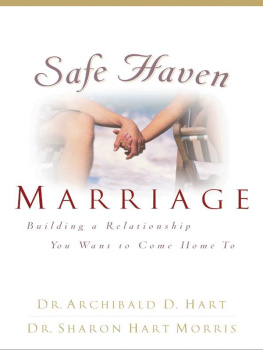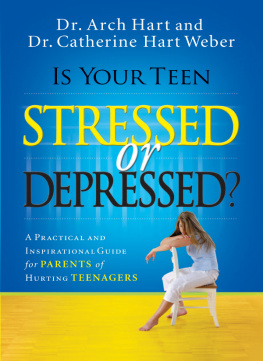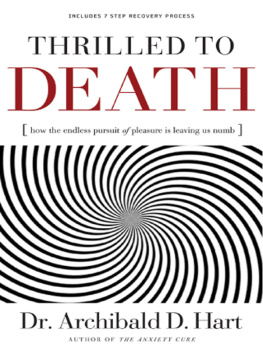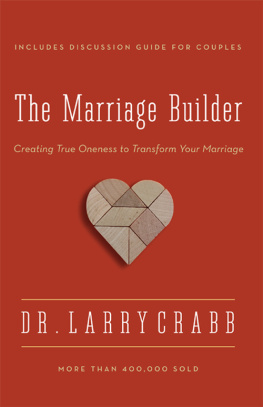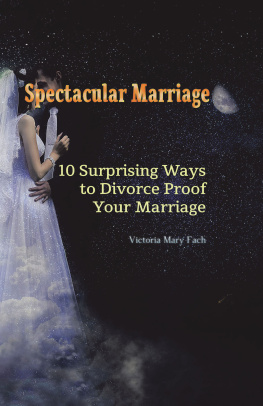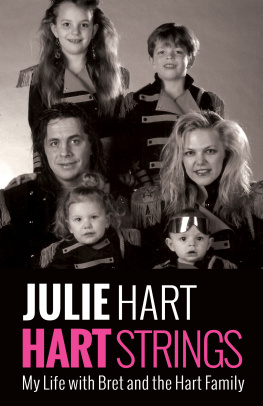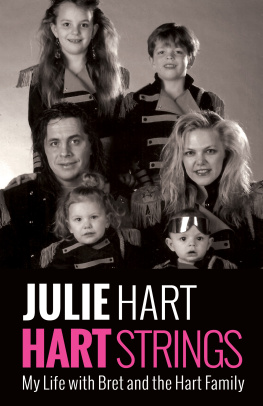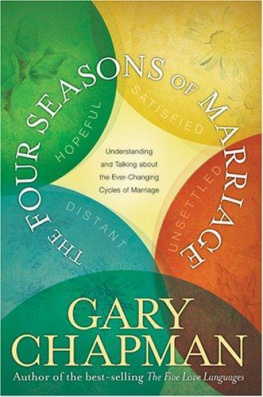
Safe Haven
MARRIAGE
Safe Haven
MARRIAGE
A Marriage You Can Come Home To
DR. ARCHIBALD D. HART
DR. SHARON HART MORRIS

SAFE HAVEN MARRIAGE
Copyright 2003 Archibald D. Hart and Sharon Hart Morris.
All rights reserved. No portion of this book may be reproduced, stored in a retrieval system, or transmitted in any form or by any meanselectronic, mechanical, photocopy, recording, or any otherexcept for brief quotations in printed reviews, without the prior permission of the publisher.
To protect the privacy of individuals, each story is a summary of typical aspects of numerous couples.
Published by W Publishing Group, a division of Thomas Nelson, Inc.,
P.O. Box 141000, Nashville, Tennessee 37214.
Scripture quotations used in this book are taken from The Holy Bible, New International Version, copyright 1973, 1978, 1984 by International Bible Society. Used by permission of Zondervan Publishing House.
Library of Congress Cataloging-in-Publication Data
Hart, Archibald D.
Safe haven marriage / by Dr. Archibald D. Hart and Dr. Sharon Hart Morris.
p. cm.
ISBN 0-8499-1777-8 (hardcover)
1. Marital psychotherapyPopular works. 2. MarriagePsychological aspectsPopular works. 3. Emotions. 4. Attachment behavior. I. Morris, Sharon Hart. II. Title.
RC488.5.H375 2003
616.89'156dc21
2002154343
Printed in the United States of America
03 04 05 06 BVG 9 8 7 6 5 4 3 2 1
Thank you, Mike, for your love and support over the years.
To my sons, Vincent and Alan, precious to my heartyou both light up my life.
Thanks, Dad, Mom, Catherine, and Sylvia, for encouraging me and always being there.
SHM
To the precious gem of my heartmy safe haven partner and encourager, Kathleenand my three daughters: Catherine, Sharon, and Sylvia, who together are the most precious persons in my life.
ADH
CONTENTS
The need for emotional connections and a safe haven marriage
The importance of emotionally connecting your hearts
Three key ingredients of a safe haven marriage, and a test for your own marriage
The attachment bonds that connect your hearts and how they work in your marital relationship
The four attachment styles that affect how you bond in a relationship
The pursue-withdraw cycle that keeps you and your spouse emotionally disconnected
The emotions that fuel your interactional patterns and cycles
How to understand, empathize, accept, and change as a way of connecting
How to heal betrayals, broken trust, and other incidents when your spouse was not there for you
T hank you to Brent Bradley for introducing me to emotionally focused therapy and to Susan Johnson for her training and continued support. Your influence has impacted my work and my own relationships. I thank my colleagues and supervisors at La Vie Counseling Center, who are a constant source of support. To the couples who have taught me by trial and error how to foster a safe haven marriageyour vulnerability is humbling.
Thanks also to Ernie Owen, Laura Kendall, and W Publishing Group for their belief in us and in this book; and to Lela Gilbert for her skillful editing. To all our friends, colleagues, and loved ones, thank you for all your patience, encouragement, and prayers. Thank you, Mike May, for your love. Without each of your contributions, this book would not have been possible. We thank you for sharing your lives so that other lives can be touched.
Sharon Hart Morris
A re you emotionally connected with your husband or your wife? Do you sense that your spouse understands and values you? Is your wife or your husband a safe havena trustworthy person with whom you can be completely secure, knowing that you are loved, accepted for who you are, and cared for above anyone else? Do you feel you can trust your spouse with the deepest parts of your heart?
While some of you can answer these questions with a resounding yes or even most of the time, many marriage partners cannot. Even if they are committed to a lifelong marriage, for a variety of reasons they feel to some degree emotionally disconnected from their spouse.
Maybe your heart sank as you read the first paragraph of this introduction, and you wondered whether such a relationship was even possible for you. You may fear that your spouse is not capable of changing enough to make such a marriage possible. Or perhaps you dont know if you can risk being vulnerable so to become a safe haven to your spouse.
Weve written this book for you, and for all those who long to be emotionally connected with their spouse. Whether you are in a stable marriage that simply needs some strengthening, or in a painful and empty marriage that is almost on the rocks, we believe that we have something to offer you, something that is distinctively different from what you may have found in other marriage handbooks.
We call the type of marriage we are proposing here a safe haven marriage, and our choice of terms is very intentional.
We are not calling it a happy marriage or a romantic marriage; we are aiming to help you create a safe haven marriage. And when your marriage is a safe haven, happiness and romance will naturally ensue. If your marriage is not very happy or satisfying, chances are it is not an emotionally safe place for either you or your spouse.
During the process of working toward a safe haven marriage, we will not focus on instructing you to become a better communicator or to take your spouse out on more dates. These may be important, but our focus is going to be on developing an emotional connection. If you dont have a good emotional connection, increased talking or frequent dates will merely end in more conflict. Only when your emotional connection is secure do talking and dating become genuinely exciting and satisfying.
This book will help you and your spouse understand your relationship in a new way, exploring and examining your marriage through a lens called attachment theory. Our method of doing marital therapy is based on this theory, and it is called emotionally focused therapy. Much of what we share here is based on these approaches. This book is intended for couples who are seeking help, although we hope that counselors will find our work beneficial as well.
The chapters provide step-by-step methods for emotionally connecting, healing past hurts, and fostering a closer attachment bond between spouses. And what could be more important? Our culture reflects a tragically high divorce ratemore than 50 percent. This statistic tells us that couples are unable to maintain a relationship for the long haul. And it also makes us aware that counselors are not successfully impacting struggling couples in their plight. Perhaps were beginning to understand why.
For years, marital therapy has focused on communication skills and resolving conflicts. Andrew Christensen and the late Neil Jacobson spearheaded the behavioral approach to marital counseling, and both spent decades of their lives researching, only to come to recognize the limitations in their widely used and accepted counseling methods. They reported, A good third of couples did not respond to the treatment, and even among those who did respond positively, a substantial number relapsed in the years following treatment. From a scientific standpoint, the best available wasnt that good.
Why have the behavioral and many other approaches been so unsuccessful? Because, in order to perform the tasks necessary to make the therapy effective, couples need to be emotionally connected. Conflict resolution and communication skills dont pump life back into an ailing marriage, and they dont help couples trust each other. These techniques are helpful, but they dont enable couples to feel safe, loved, valued, and understood.
Next page
